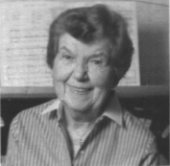


Louise Aukerman welcomed me at the front door of her home with a warm smile. Soft spoken and pleasant, she worked with her husband running USO's across the country. Mrs. Aukerman and her husband were living in a small house in Detroit, Michigan, expecting their first child when Pearl Harbor was attacked.
Now we weren't really expecting the attack, and yet we can't say it was a total surprise. When war was declared everybody rallied. Everybody wanted to help, to get into it.
So we resigned ourselves that he would be drafted. And with a new baby coming in June, we were very much upset, but what else could you do?
Then one day, out of the blue, a letter came from the army/navy branch of he YMCA saying that my husband had been given a security check and was eligible for USO training. Now, USO was the United Services Organization, made up of the Jewish, the Catholics, and the Protestants, all joined together in providing a single civilian agency to deal with the military and to help the servicemen.
His first assignment was to the USO club in Charleston, South Carolina. I had lived in Michigan all my life, and although I knew a little bit about the South and what it might be like, I wasn't really prepared for it at all. If you had never been where there was discrimination , you can't imagine how hard it was to accept. I'd get on the bus and Black people would have to wait until every white person got on, and then they got on. Black people had to go to a certain water fountain to drink. They had their own part in the rest rooms. I really didn't enjoy this experience.
Louise Aukerman worked with her husband in the USO from 8 in the morning until about 2 a.m. the next day.
We just had very little sleep, but it was such a great need that we were trying to fill.
She was working all the time with hardly any free time for herself, and yet she only thought that the more she worked the more people she helped.
One of the services we had that I worked on had one little room where we had a recorder, not like we have now but with these sort of soft floppy record disks. Fellows could go in there and make a record and send it to their folks. Often I would run the machine, and since I was about 28 at the time, the fellows felt comfortable talking to the record in front of me. Charlestion was an embarkation and debarkation port which meant boys would be leaving for overseas or coming home, so when a hospital ship came in, we would have injured servicemen coming into the club, men who were on crutches or bandaged. They would go in to make these records, and they would have to tell wives or their mothers that they had lost a limb or an arm. So here they were trying to explain to their families what had happened so that when they got home it wouldn't be a shock. It was awfully hard to listen to these men tell what happened to them. They would break down and weep and cry. But it was a wonderful service, because they could get this out and communicate. Sometimes it was very sad because sometimes they had just gotten a "Dear John" letter or something, and they were answering it.
As Mrs. Aukerman told me about the recordings, tears came to her eyes. She remembered the soldiers or "fellows" as she so kindly called them.
We did a lot of counseling or just listening besides just providing the dances and church services. One night, for instance, it was almost midnight and this young fellow came rushing in. He said to me, "Oh, I don't know what I'm going to do. My wife is coming from Washington, the state of Washington, all the way across the country on the bus, and I'm to meet her. We just got orders that we are shipping out in an hour!" You can imagine how hard it was for me to meet that bus, meet that young woman who had traveled all the way across the country, only to tell her that her husband had just shipped out. Those were the kinds of things that were hard to accept. That's the way it was.
The whole thing was very exhausting, but the rewards were just beyond measure. We'd often heard that it is more blessed to give than to receive. We learned through experience that this is certainly true. A life of service is really rewarding.
Copyright 1995